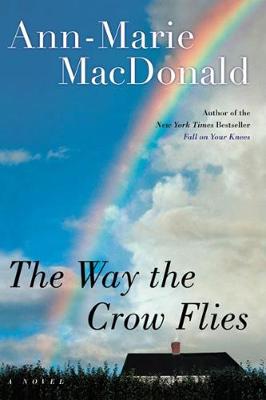Reviewed by brokentune on
We forget the consolation of the common thread-the way events are stained with the dye of the stories older than the facts themselves.
We lose our memory.
This can make a person ill.
This can make a world ill."
When I first picked up this book, I read the description and the tags and labels that people had pinned on it. When I first looked at this book, I did not think I'd ever read this.
What persuaded me to read it was that MacDonald's first book was written so well that I wanted to see how she would tell the story of The Way the Crow Flies.
But how can you tell this story of the murder of a child - even if the story is partly based of the real life case of Steven Truscott? How can you tell of the lies and secrets that unravel the lives of everyone involved? Of the naivety of the individuals that condemn evil and, yet, at the same fail to see that it is their own simple-mindedness that fuels the travesty of justice that ensues?
MacDonald tells it masterfully. She uses imagery and language that packs a punch. Never overly evocative or manipulative, she shows each story from the characters point of view - and this at times makes you want to stop reading and jump in and shake the person. At other times, this makes you draw the book in closer and cling to every page to find out what happens next.
The Way the Crow Flies is, however, not only the story of a community torn apart by the murder. The book goes deeper. Whilst the books' main character, Madeleine, tries to deal with the events in her own life - events which she feels she cannot speak of, which she feels she needs to protect her family from -, her father, Jack, becomes entangled in a cold war scientific espionage plot in aid of the West's race to the moon.
A boys' own adventure, which in turn will make him question everything he believes in. But to what end? And while he is keen to teach his daughter that the truth must be told, is he mature enough to take responsibility for the consequences?
On another level, MacDonald draws out the individual dilemmas against a historical context - not just the backdrop of the Cold War, but also that of the Second World War - paralleling the space race to the development of the V2 and the atomic bomb. All are inextricably linked through the people that were involved. However, this link creates an issue - How can the same people be working for opposing ideologies?
"But he has enough - his children have enough - to cope with, never mind taking on the past. To report this man would not only be futile; it would be to exhume what is cold and can never heal. To haunt his new family with the inconsolable griefs of his old one."
The book does not try to answer this question but offers serious food for thought. Because the stories, or rather the secrets of both, father and daughter, are bound to test their ideals, their perception of each other and of the world.
"This precious mess. Democracy. How much can be done in its name before, like an egg consumed by a snake, it becomes a mere shell?"
Without knowing of each other's secrets, both main characters are wounded in the process. Are they able to heal?
The Way the Crow Flies has seriously impressed me. MacDonald has not only written a mystery, a political thriller, and a court room drama all in one, she also created a deep and complex psychological tour de force that questions whether the reality we perceive always ties up with the facts and how this reality changes as we mature. Individuals are defined by their story unless they take action to confront it.
Nina says: "Fear isn't the opposite of courage."
"What?"
"It's the prerequisite to courage."
Review originally posted on BookLikes: http://brokentune.booklikes.com/post/1082831/the-way-the-crow-flies
Reading updates
- Started reading
- 11 January, 2015: Finished reading
- 11 January, 2015: Reviewed
